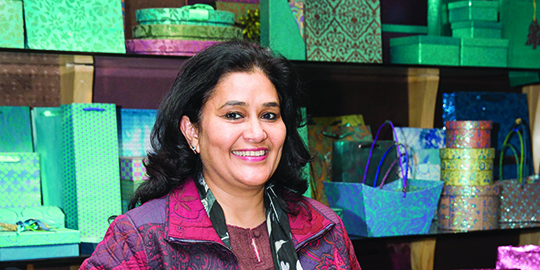
Spreading Excellence
Ozone International, which was started as a small boutique of hand painted bed covers by Savina Sharan, today supplies its wares to retail giants across the globe.
Manisha Choudhari | March 2016 Issue | The Dollar Business
Savina Sharan has always been ambitious and focused when it comes to her work, the testament to which are the multiple feathers in her cap. With two export oriented units (EOUs) under her wing, one wonders how she manages to juggle it all. Having been in her line of work for over three decades, Savina emphasises on the importance of dressing well, knowing your market, and being confident. Referring to her childhood, she says, “I come from a small town – Meerut. I haven’t been to any big institutes or colleges, but life itself is a big education. We were allowed to do whatever we wanted.” It gave her the confidence to pursue her interests, and attain what she has today.
While she enjoys being recognised for her work – and there are many awards, like the ‘Priyadarshini Award 2012’ from Federation of Indian Women Entrepreneurs (FIWE) for outstanding Women Entrepreneur of the Year, and a number of awards from Export Promotion Council for Handicrafts (EPCH) – the most important achievement for her is work satisfaction. “I really enjoy my work, it’s what keeps me going”, she grins, “I have been able to involve a lot of women in my work in a male-dominated industry. Moreover, we are working on eco-friendly papers. It is also good for the environment, so we are looking to the future. It is a good feeling”. What's more important? Today she is a supplier to global giants like Walmart, Target, Barnes and Noble, Harrods and many more such importers across the globe.
TDB: You have been in the business for 35 years now. How did it all begin? Where do you export to?
Savina Sharan (SS): I started out in Mumbai, by painting bedcovers, and then shifted to Delhi as an entrepreneur, where my husband and I started a small business of making corporate gifts. I was always interested in developing prints and colours, so we first started with handmade paper in a very small way. We would also participate in EPCH fairs, which really boosted our growth. In early 90s, there was no way of finding out what was going on around the world. So, I would travel to England, spend time on the High Street, and learn from their products. Buyers started liking my designs, and would pick up my designs as they were. Last year, we exported to the South American countries of Chile and Brazil. We also send products to Spain and Greece.
TDB: Do you import your raw material? If so, from where?
SS: Some of our raw material comes from China, but we try to acquire raw material locally as much as possible. Art Papyrus, however, is 100% Made in India – we do not use imported raw material in its products.
TDB: As the owner of two EOUs, could you tell us about the hurdles you have faced, if any, when it comes to exports? 
SS: I haven’t faced any hurdles as such, but it would be good to have incentives and benefits from the government. Chinese exporters get a number of benefits from their government. I’ve seen exhibitions where the Chinese suppliers put up their products, and the government not only supports via funding for their visits, but also pays them for putting up their samples. These efforts help in boosting exports from China. There is no special treatment as such given to exports of handicrafts in India. EPCH, however, has been highly supportive to us as an organisation.
Next Page: Cashing In On E-Tail



 to success.
to success.